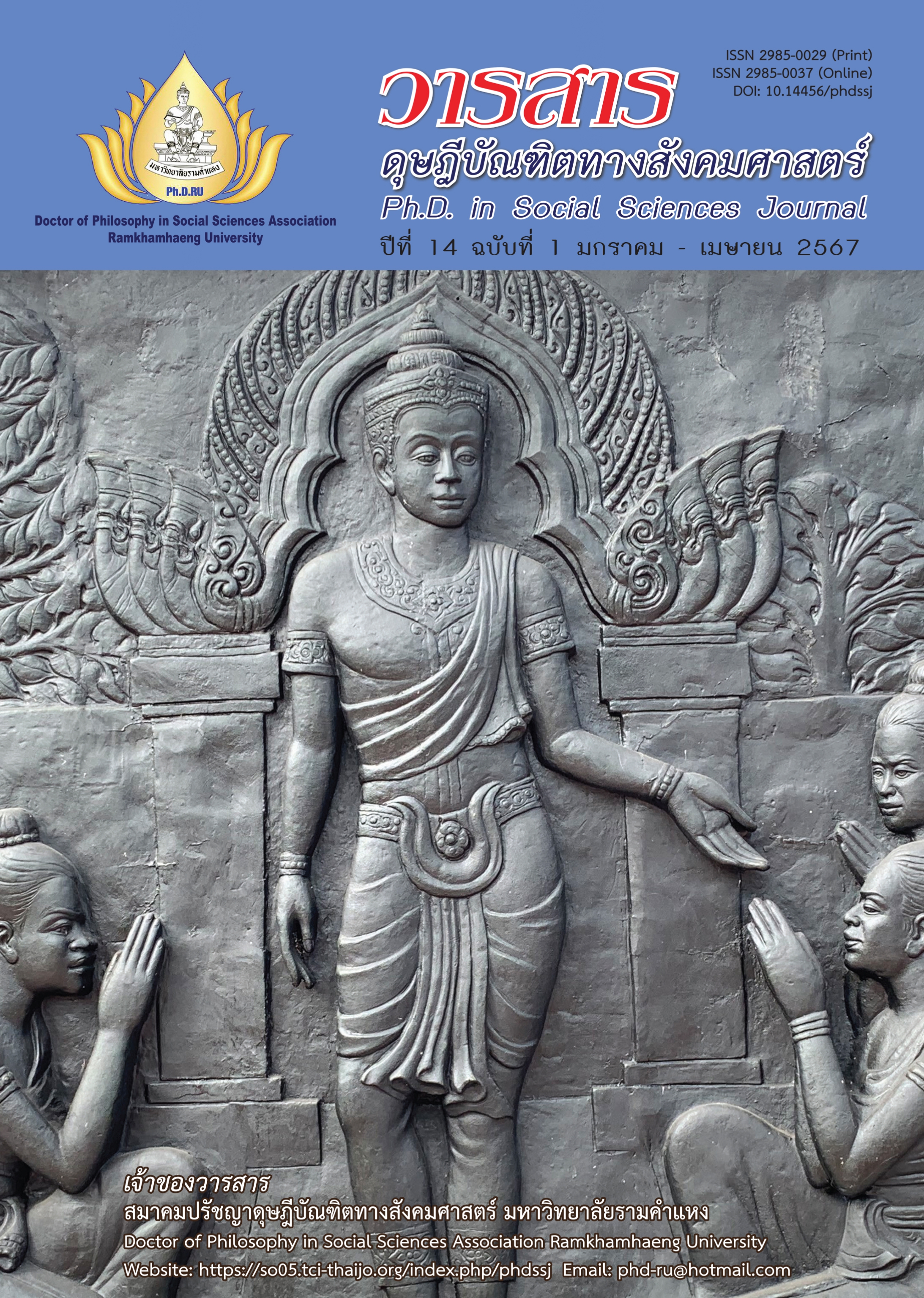Dhamma Instincts and Politicians’ Political Conflicts
Main Article Content
Abstract
This research article aims to study (1) dhamma instincts, the internal and external factors of politicians leading to political crises in Thai society; to investigate (2) the characteristics of political conflicts leading to political crises in Thai society; and to propose (3) guidelines to solve problems of political conflicts in Thai society in an integrated manner. Using qualitative research methods and collecting data through document research and in-depth interviews. Data were analyzed using content analysis techniques.
Findings are as follows: Internal factors as the motives in the working in politics of most politicians are the thinking system called mental factors which are evil mental factors. These are the causes of all problems in this world. This will result in the mental conditions lacking common sense in their duties or dhamma instincts. When the mental factors of politicians as internal factors are evil mental factors, politicians do not have dhamma instincts in their duties. Their intents are expressed in the behaviors that need to seek for power and interests as external factors. They use power in their duties to foster interests for themselves. This leads to accumulated conflicts of interests and have turned into severe conflicts causing political crises. Guidelines to solve the problems of political conflicts in Thai society in an integrated manner are as follows. Use the Buddhist methods to foster dhamma instincts in performing the duties of politicians. They need to have a conscience to know their own duties. Dhamma principles or practical guidelines appropriate with duties or Dhamma vicaya based on the principle of the Seven Factors of Awakening, the construction of self-knowledge should be practiced to create peacefulness and calmness in society in a true manner. The principle of Sāranīyadhamma (states of conciliation) should be employed to prevent conflicts such as putting one’s self in someone else’s shoes and paying mutual respect. Iddhipada 4 (path of accomplishment) can be used as additional practical guidelines to supplement and support the Seven Factors of Awakening to be more efficient.
Article Details

This work is licensed under a Creative Commons Attribution-NonCommercial-NoDerivatives 4.0 International License.
Academic articles, research articles, and book reviews in the Ph.D. in Social Sciences Journal are author’s opinions, and not the publisher’s, and is not the responsibility of the Ph.D. in Social Sciences Journal Philosophy Association, Ramkhamhaeng University. (In the case that research is done on human, the researcher has to be trained in Ethics for Doing Research on Human Training and has to produce the evidence of the training).
References
Buddhadasa. (1993). The root cause of all problems in the world. Retrieved from https://youtu.be/97rhaQpC17c [In Thai]
Buddhadasa. (2020a). Dharma talk on Sunday of the year 1982, the 3rd time, about mental training. Retrieved from https://www.pagoda.or.th/buddhadasa/2525-3-3.html [In Thai]
Buddhadasa. (2020b). Training Phra Navaka in the year 1969, the 27th time, Dharma as a tool (Iddhipada 4, Article 1). Retrieved from https://pagoda.or.th/buddhadasa/2512-27-1.html [In Thai]
Duangden Thitayano, Phramaha. (2015). Resolving social conflicts according to the concept of Nicolo Machiavelli. Journal of MCU Peace Studies, 3(2), 115-132. [In Thai]
Khamphan, K., & Srikhruedong, S. (2021). Buddhist psychology for mind revival of those who are disappointed in love. Journal of MCU Humanities Review, 7(2), 289-307. [In Thai]
Mangsang, S. (2019). Saranee Dhamma 6: Principles of coexistence. Retrieved from https://mgronline.com/daily/detail/9620000029668 [In Thai]
Mathulaprangsan, K. (2021). The factors and conditions of conflict in Thai society. Journal of Yanasangvorn Research Institute, 1(12), 120-130. [In Thai]
Moore, C. W. (1986). The mediation process: Practical strategies for resolving conflict. Jossey-Bass.
Paijit Uttamadham, Phramaha., & Natthawut Sanguanngam, Phramaha. (2020). Principle for quality and success of research. Journal of Buddhamagga, 5(2), 79-87. [In Thai]
Phrakhru Pibulthammasathit Thitsaukho (Yangboonsong). (2018). An application of Saraniya Dhamma in work performance of personel in Tambol Ronpibun Municipality, Ronpibun district, Nakhon Si Thammarat province. Journal of Nakhonratchasima College, 12(1), 110-121. [In Thai]
Phujeenaphan, P. (2020). Political activities and electoral behavior in the 2019 Thailand general election in Chiangmai. King Prajadhipok’s Institute. [In Thai]
Satitniramai, A., & Unno, A. (2017). Good people politics: Thoughts, actions, and political identity of supporters movement of change in Thailand. Research Fund Office. [In Thai]
Serirangsan, T. (2019). Political science and political stability in Thailand. Journal of Humanities and Social Sciences, Surin Rajabhat University, 21(2), 347-364. [In Thai]
Somdet Phra Buddhaghosacariya (P. A. Payutto). (1982). Iddhipada 4: The way of success. Retrieved from https://www.payutto.net/book-content/อิทธิบาท-ทางความสำเร็จ/ [In Thai]
Somdet Phra Nyanasamvara (Charoen Suvaddhano). (2020). Spiritual practice book. Wat Bowonniwet Vihara. [In Thai]
Sukamongkol, S. (2014). Political conflict management in Thailand during the years 2001-2012. Kasem Bundit Journal, 15(1), 39-55. [In Thai]
Suksai, P. (2012). Conflict management of political conflict in Thailand between 2004-2010. Retrieved from http://kantacandidate.blogspot.com/2012/03/2547-2553.html [In Thai]
Suksai, P. (2014). Leaders and conflict management of political conflict in Thailand. Retrieved from http://pitchaya-suksai.blogspot.com/2014/02/blog-post.html [In Thai]
Vatanasap, V., Thontiravong, B., & Permpoonvivat, S. (2007). Conflicts: Principles and problem solving tools (3rd ed). Siriphan Offiset Printing House. [In Thai]
Vititanon, N. (2016). Conflict and violence of local politics in Thailand: A case study of Bandu Subdistrict Municipality, Mueang, Chiang Rai. Local Administration Journal, 9(4), 1-24. [In Thai]


